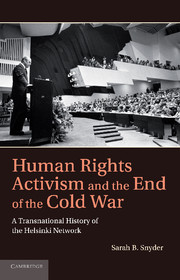Book contents
- Frontmatter
- Contents
- Acknowledgments
- Introduction
- 1 Bridging the East–West Divide
- 2 “A Sort of Lifeline”
- 3 Even in a Yakutian Village
- 4 Follow-up at Belgrade
- 5 Helsinki Watch, the IHF, and the Transnational Campaign for Human Rights in Eastern Europe
- 6 Human Rights in East–West Diplomacy
- 7 “A Debate in the Fox Den About Raising Chickens”
- 8 “Perhaps Without You, Our Revolution Would Not Be”
- Conclusion
- Bibliography
- Index
- References
3 - Even in a Yakutian Village
Helsinki Monitoring in Moscow and Beyond
Published online by Cambridge University Press: 01 June 2011
- Frontmatter
- Contents
- Acknowledgments
- Introduction
- 1 Bridging the East–West Divide
- 2 “A Sort of Lifeline”
- 3 Even in a Yakutian Village
- 4 Follow-up at Belgrade
- 5 Helsinki Watch, the IHF, and the Transnational Campaign for Human Rights in Eastern Europe
- 6 Human Rights in East–West Diplomacy
- 7 “A Debate in the Fox Den About Raising Chickens”
- 8 “Perhaps Without You, Our Revolution Would Not Be”
- Conclusion
- Bibliography
- Index
- References
Summary
The Helsinki Final Act spurred a profusion of dissident activity in Eastern Europe, which eventually created broad, domestic political implications for Soviet and Eastern European leaders. At the same time as the Commission was established in the United States, Eastern Europeans were mobilizing less formal, but equally important, elements of the transnational network. The monitoring groups that developed across Europe called upon the Soviet Union and others to uphold their Helsinki commitments and drew international attention to their reports of human rights abuses. These groups, including most prominently the Moscow Helsinki Group, became part of a larger political and social movement that influenced the end of the Cold War. This chapter explains how the monitoring groups that developed in the Soviet Union and elsewhere reframed the content and significance of the Helsinki Final Act, using it to advance human rights in Eastern Europe.
Although the Helsinki Final Act provided the impetus for the formation of new groups, many of the key figures in the Helsinki network had previously worked together to advance human rights. Activists in the Soviet Union had organized together sporadically for more than a decade; their early efforts included protests such as the December 1965 demonstration in Moscow's Pushkin Square to commemorate the anniversary of the Universal Declaration of Human Rights, which a close observer of Soviet human rights activism has argued marked the “birth” of the civil rights movement in the Soviet Union and the first movement of its kind in a socialist state.
- Type
- Chapter
- Information
- Human Rights Activism and the End of the Cold WarA Transnational History of the Helsinki Network, pp. 53 - 80Publisher: Cambridge University PressPrint publication year: 2011

